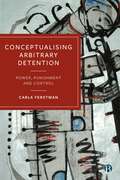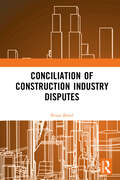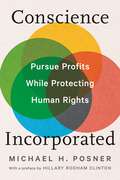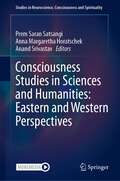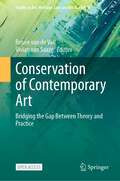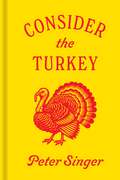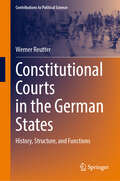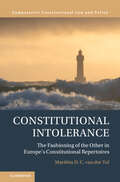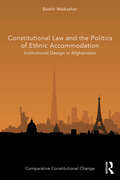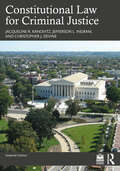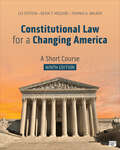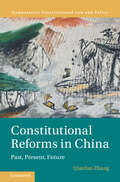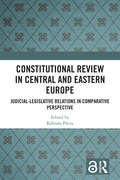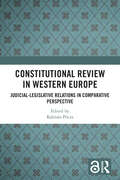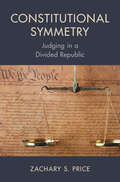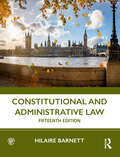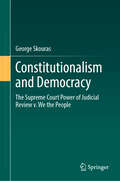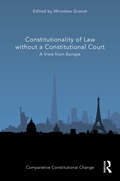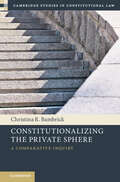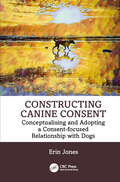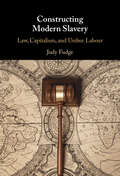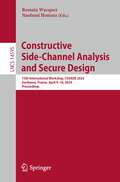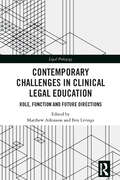- Table View
- List View
Conceptualising Arbitrary Detention: Power, Punishment and Control
by Carla FerstmanAvailable open access digitally under CC-BY-NC-ND licence This book examines what happens when states and other authorities use detention to abuse their power, deter dissent and maintain social hierarchies. Written by an author with decades of practical experience in the human rights field, the book examines a variety of scenarios where individuals are unlawfully detained in violation of their most basic rights to personal liberty and exposes the many fallacies associated with arbitrary detention. Proposing solutions for future policy to scrutinise processes, this is a call for greater respect for the rule of law and human rights.
Conciliation of Construction Industry Disputes
by Brian BondConciliation of Construction Industry Disputes describes Conciliation as it has evolved and been practised in Ireland for the past 25 years and provides readers with practical guidance on this Alternative Dispute Resolution (ADR) method. Conciliation combines advantages of both mediation and adjudication and has been very widely practiced in Ireland over the last 25 years. It is low cost, quick and has been hugely successful. It continues to be the most used and preferred method of resolution of disputes in Irish construction contracts despite the introduction of statutory adjudication. The book includes a comparison of the various methods of ADR and will assess how Conciliation fits into them, noting the pros and cons of each. Conciliation is described in detail and the reasons for its success are analysed. This book provides comprehensive guidance on how conciliation should be conducted to maximise its chance of being successful. Drawing on his wide experience of resolving disputes by conciliation, Brian Bond illustrates the problems which can be encountered and how they may be overcome. This book will be useful reading for all involved in construction contracts, construction managers, lawyers and legal advisers, conciliators, those aspiring to become conciliators and anyone looking for an alternative dispute resolution method to a construction contracts dispute.
Conscience Incorporated: Pursue Profits While Protecting Human Rights
by Michael H. PosnerA guide for business leaders working to create socially conscious, sustainable companies—while pursuing profitsAmid growing international concerns about income inequality, labor abuses, racial injustice, and disinformation online, Conscience Incorporated examines the gaps in current corporate social responsibility measures and what more needs be done to address these challenges. The rise of new technologies such as smartphones and social media have made it easier than ever to document and spread awareness of corporate actions. Despite these developments, large corporations often fail to meaningfully address the human rights abuses linked to their business models and practices. In Conscience Incorporated, Michael Posner addresses what lies at the root of these challenges, drawing on his extensive personal experience as a human rights lawyer, State Department official under President Obama, chair of the Fair Labor Association and Director of the Center for Business and Human Rights at NYU Stern School of Business.Drawing from research into the history of business ethics and anchoring his argument with examples of companies publicly accused of human rights abuses—Nike, Coca-Cola, Walmart, Meta, and more—Posner provides a blueprint for global business leaders to navigate human rights challenges and adopt sustainable corporate practices. Conscience Incorporated highlights the need for increased protections for outsourced workers in faraway nations, greater attention to harmful online content, and prioritization of human rights by investors. He argues that growing public awareness has not been enough to enforce ethical practices for global businesses. As a result, governments, especially in Europe, are becoming more involved in regulating global business practices in various industries.Posner proposes a series of concrete reforms and argues compellingly for why businesses need to devote greater time and resources to protecting basic human rights. Conscience Incorporated is a powerful challenge to the status quo and advocates for a fundamental shift in the principles that govern global businesses.
Consciousness Studies in Sciences and Humanities: Eastern and Western Perspectives (Studies in Neuroscience, Consciousness and Spirituality #8)
by Anand Srivastav Prem Saran Satsangi Anna Margaretha HoratschekThis book presents consciousness models from Eastern and Western perspectives that accommodate current scientific research in the natural sciences and humanities, from neurological experiments through philosophical enquiries to spiritual approaches. It offers up to date research from key disciplines in consciousness studies ranging from neurology, quantum mechanics, algorithmic science, mathematics, and astrophysics to literary studies, philosophy, and (comparative) theology. The volume examines the dichotomy between Western and Eastern perceptions of consciousness – where consciousness is perceived as brain activity by Western scientists, and as a divine presence by various religions, especially in the East. The essays contextualize each other and reciprocally illuminate the potential and limits of the respective approaches. The texts aim at a transdisciplinary and transcultural exchange of ideas in consciousness studies and address a readership from interested lay-readers to experts of the field. The volume is of interest to researchers of consciousness studies.
Conservation of Contemporary Art: Bridging the Gap Between Theory and Practice (Studies in Art, Heritage, Law and the Market #9)
by Vivian Van Saaze Renée van de VallThis open access book investigates whether and how theoretical findings and insights in contemporary art conservation can be translated into the daily work practices of conservators or, vice versa, whether and how the problems and dilemmas encountered in conservation practice can inform broader research questions and projects. For several decades now, the conservation of contemporary art has been a dynamic field of research and reflection. Because of contemporary art’s variable constitution, its care and management calls for a fundamental rethinking of the overall research landscape of museums, heritage institutions, private-sector organizations and universities. At first, this research was primarily pursued by conservation professionals working in or with museums and other heritage organizations, but increasingly academic researchers and universities became involved, for instance through collaborative projects. This book is the result of such collaboration. It sets out to bridge the “gap” between theory and practice by investigating conservation practices as a form of reflection and reflection as a form of practice.
Consider the Turkey
by Peter SingerWhy this holiday season is a great time to rethink the traditional turkey feastA turkey is the centerpiece of countless Thanksgiving and Christmas dinners. Yet most of us know almost nothing about today&’s specially bred, commercially produced birds. In this brief book, bestselling author Peter Singer tells their story—and, unfortunately, it&’s not a happy one. Along the way, he also offers a brief history of the turkey and its consumption, ridicules the annual U.S. presidential &“pardon&” of a Thanksgiving turkey, and introduces us to &“a tremendously handsome, outgoing, and intelligent turkey&” named Cornelius. Above all, Singer explains how we can improve our holiday tables—for turkeys, people, and the planet—by liberating ourselves from the traditional turkey feast. In its place, he encourages us to consider trying a vegetarian alternative—or just serving the side dishes that many people already enjoy far more than turkey. Complete with some delicious recipes for turkey-free holiday feasting, Consider the Turkey will make you reconsider what you serve for your next holiday meal—or even tomorrow&’s dinner.
Constitutional Courts in the German States: History, Structure, and Functions (Contributions to Political Science)
by Werner ReutterThe book takes stock on constitutional adjudication in the German states. It includes surveys on the Constitutional Court in Berlin, the origins and development of state constitutional courts in Germany, their status and mode of operation, their justices, and the role these courts play at the subnational level in Germany.
Constitutional Intolerance: The Fashioning of the Other in Europe's Constitutional Repertoires (Comparative Constitutional Law and Policy)
by Mariëtta D. van der TolConstitutional Intolerance offers a deeper reflection on intolerance in politics and society today, explaining why minorities face the contestation of their public visibility, and how the law could protect them. Van der Tol refers to historical practices of toleration, distilling from it the category of 'the other' to the political community, whose presence, representation, and visibility is not self-evident and is often subject to regulation. The book considers 'the other' in the context of modern constitutions, with reference to (ethno)religious, ethnic, and sexual groups. Theoretical chapters engage questions about the time and temporality of otherness, and their ambivalent relationship with (public) space. It offers examples from across the liberal-illiberal divide: France, the Netherlands, Hungary, and Poland. It highlights that vulnerability towards intolerance is inscribed in the structures of the law, and is not merely inherent to either liberalism or illiberalism, as is often inferred.
Constitutional Law and the Politics of Ethnic Accommodation: Institutional Design in Afghanistan (Comparative Constitutional Change)
by Bashir MobasherThis book explores whether the legal and political institutions of Afghanistan were able to incorporate diverse ethnic groups into the political process. Ethnic accommodation has gained central stage in the literature on institutional design and democratic consolidation. However, some divided societies are more explored than others, and Afghanistan is one understudied country that is critically important for testing and improving our theories of institutional design in a democratizing, plural society. This work examines the Constitution of 2004 and those provisions of electoral laws and political party laws that together devised Afghan political institutions including those of the presidential system, unitary government, electoral systems as well as the party system. It argues that due to their incongruence in design and effects, the Afghan political institutions failed to fully accommodate ethnic groups in the political process. This book adopts a holistic approach, while also paying careful attention to the details of each of the individual pieces of political institutions designed by the Constitution of 2004. Taken together, this approach yields insights into the boundaries and interactions of institutional design and how their interactions hinder or advance ethnic accommodation in varying contexts. The book will be essential reading for academics, researchers and policy makers interested in constitutional law and politics.
Constitutional Law for Criminal Justice
by Jefferson L. Ingram Jacqueline R. Kanovitz Christopher J. DevineConstitutional Law for Criminal Justice, Sixteenth Edition, offers criminal justice professionals the training they need to recognize the constitutional principles that apply to their daily work. Jacqueline R. Kanovitz, Jefferson L. Ingram, and Christopher J. Devine provide a comprehensive, well-organized, and up-to-date analysis of constitutional issues that affect the U.S. justice system. Chapter 1 of Part I summarizes the organization and content of the Constitution, the Bill of Rights, and the Fourteenth Amendment. The next eight chapters cover the constitutional principles that regulate investigatory detentions, traffic stops, arrests, use of force, search and seizure, technologically assisted surveillance, the Wiretap Act, interrogations and confessions, self-incrimination, witness identification procedures, the right to counsel, procedural safeguards during criminal trials, First Amendment issues relevant to law enforcement, and capital punishment. The final chapter covers the constitutional rights of criminal justice professionals in the workplace, their protection under Title VII of the Civil Rights Act, and their accountability under 42 U.S.C. § 1983 for violating the constitutional rights of others. Part II contains abstracts of key judicial decisions exemplifying how the doctrines covered in earlier chapters are being applied by the courts. The combination of text and cases creates flexibility in structuring class time. This book makes complex concepts accessible to students in all levels of criminal justice education. The chapters begin with an outline and end with a summary. Key Terms and Concepts are defined in the Glossary. Tables, figures, and charts are used to synthesize and simplify information. The result is an incomparably clear, student-friendly textbook that has remained a leader in criminal justice education for more than 50 years. The accompanying Instructor and Student Resources website provides free digital materials designed to test student knowledge and save time when preparing lessons. Resources include: Student access to practical quizzes including multiple-choice and true-or-false questions, and case studies with interactive questions and answers to test and apply knowledge A downloadable comprehensive study guide, glossary, and appendix including the text of the United States Constitution to enhance understanding of each chapter alongside study Step-by-step Instructor Guides and premade lesson slides that correspond to the chapters in an editable format to saving valuable time on lesson preparation Instructor access to test-bank questions for further exam practice
Constitutional Law for a Changing America: A Short Course
by Thomas G. Walker Lee J. Epstein Kevin T. McGuire"Excellent balance of case excerpts and author explanation, highly appropriate for undergraduate students." —Dr. Wendy Brame, Briar Cliff University Political factors influence judicial decisions. Arguments and input from lawyers and interest groups, the ebb and flow of public opinion, and especially the ideological and behavioral inclinations of the justices all combine to shape the development of constitutional doctrine. Drawing from political science as much as from legal studies, Constitutional Law for a Changing America: A Short Course helps students realize that Supreme Court cases are more than just legal names and citations. With meticulous revising, the authors streamline material while accounting for recent landmark cases and new scholarship. Ideal for a one semester course, the Ninth Edition of A Short Course offers all the hallmarks of the Rights and Powers volumes (also included in the Constitutional Law for a Changing America series) in a more condensed format. Included with this title: LMS Cartridge: Import this title’s instructor resources into your school’s learning management system (LMS) and save time. Don’t use an LMS? You can still access all of the same online resources for this title via the password-protected Instructor Resource Site. Learn more.
Constitutional Law for a Changing America: A Short Course
by Thomas G. Walker Lee J. Epstein Kevin T. McGuire"Excellent balance of case excerpts and author explanation, highly appropriate for undergraduate students." —Dr. Wendy Brame, Briar Cliff University Political factors influence judicial decisions. Arguments and input from lawyers and interest groups, the ebb and flow of public opinion, and especially the ideological and behavioral inclinations of the justices all combine to shape the development of constitutional doctrine. Drawing from political science as much as from legal studies, Constitutional Law for a Changing America: A Short Course helps students realize that Supreme Court cases are more than just legal names and citations. With meticulous revising, the authors streamline material while accounting for recent landmark cases and new scholarship. Ideal for a one semester course, the Ninth Edition of A Short Course offers all the hallmarks of the Rights and Powers volumes (also included in the Constitutional Law for a Changing America series) in a more condensed format. Included with this title: LMS Cartridge: Import this title’s instructor resources into your school’s learning management system (LMS) and save time. Don’t use an LMS? You can still access all of the same online resources for this title via the password-protected Instructor Resource Site. Learn more.
Constitutional Reforms in China: Past, Present, Future (Comparative Constitutional Law and Policy)
by Qianfan ZhangThis book offers the reformist perspective of one of the most persistent and outspoken constitutional reformers in China. Through the analysis of landmark constitutional events in China since the late nineteenth century, it reveals the fatal dilemma faced by constitutional reform and the deadly dangers of any violent revolution that arises out of the frustration with the repeated failures of reform. Although there is no easy way out of such a predicament, the book analyzes available resources in the existing system and suggests possible strategies that might bring success to future constitutional reforms.
Constitutional Review in Central and Eastern Europe: Judicial-Legislative Relations in Comparative Perspective
by Kálmán PóczaRecent confrontations between constitutional courts and parliamentary majorities in several European countries have attracted international interest in the relationship between the judiciary and the legislature. Some political actors have argued that courts have assumed too much power and politics has been extremely judicialized. This volume accurately and systematically examines the extent to which this aggregation of power may have constrained the dominant political actors’ room for manoeuvre. To explore the diversity and measure the strength of judicial decisions, the contributors to this work have elaborated a methodology to give a more nuanced picture of the practice of constitutional adjudication in Central and Eastern Europe between 1990 and 2020. The work opens with an assessment of the existing literature on empirical analysis of judicial decisions with a special focus on the Central and Eastern European region, and a short summary of the methodology of the project. This is followed by ten country studies and a concluding chapter providing a comprehensive comparative analysis of the results. A further nine countries are explored in the counterpart volume to this book: Constitutional Review in Western Europe: Judicial-Legislative Relations in Comparative Perspective. The collection will be an invaluable resource for those working in the areas of empirical legal research and comparative constitutional law, as well as political scientists interested in judicial politics.
Constitutional Review in Central and Eastern Europe: Judicial-Legislative Relations in Comparative Perspective
by Kálmán PóczaRecent confrontations between constitutional courts and parliamentary majorities in several European countries have attracted international interest in the relationship between the judiciary and the legislature.Some political actors have argued that courts have assumed too much power and politics has been extremely judicialized. This volume accurately and systematically examines the extent to which this aggregation of power may have constrained the dominant political actors’ room for manoeuvre. To explore the diversity and measure the strength of judicial decisions, the contributors to this work have elaborated a methodology to give a more nuanced picture of the practice of constitutional adjudication in Central and Eastern Europe between 1990 and 2020. The work opens with an assessment of the existing literature on empirical analysis of judicial decisions with a special focus on the Central and Eastern European region, and a short summary of the methodology of the project. This is followed by ten country studies and a concluding chapter providing a comprehensive comparative analysis of the results. A further nine countries are explored in the counterpart volume to this book: Constitutional Review in Western Europe: Judicial-Legislative Relations in Comparative Perspective.The collection will be an invaluable resource for those working in the areas of empirical legal research and comparative constitutional law, as well as political scientists interested in judicial politics.Chapters 1, 5 and 12 of this book are freely available as a downloadable Open Access PDF at http://www.taylorfrancis.com under a Creative Commons Attribution-Non Commercial-No Derivatives (CC BY-NC-ND) 4.0 license.
Constitutional Review in Western Europe: Judicial-Legislative Relations in Comparative Perspective
by Kálmán PóczaRecent confrontations between constitutional courts and parliamentary majorities in several European countries have attracted international interest in the relationship between the judiciary and the legislature.Some political actors have argued that courts have assumed too much power and politics has been extremely judicialized. Yet the extent to which this aggregation of power may have constrained the dominant political actors’ room for manoeuvre has never been examined accurately and systematically. This volume fills this gap in the literature. To explore the diversity and measure the strength of judicial decisions, the authors have elaborated a new methodology that is intended to give a more nuanced picture of the practice of constitutional adjudication in Europe. The work opens with an assessment of the existing literature on empirical analysis of judicial decisions with a special focus on Western Europe and a short summary of the methodology of the project. This is followed by 11 country studies and a concluding chapter providing a comprehensive comparative analysis of the results. A further ten countries are explored in the counterpart volume to this book: Constitutional Review in Central and Eastern Europe: Judicial-Legislative Relations in Comparative Perspective.The collection will be an invaluable resource for those working in the areas of empirical legal research and comparative constitutional law, as well as political scientists interested in judicial politics.
Constitutional Symmetry: Judging in a Divided Republic
by Zachary S. PriceIntense political disagreements over constitutional law and the Supreme Court have divided America. Constitutional Symmetry offers a fresh perspective by urging judges to make decisions that work 'symmetrically' across major partisan and ideological divides instead of favoring one partisan coalition over the other. Zachary S. Price argues this approach will aid the political process, align with the role morality of judging, and advance the framers' hopes for the Constitution. Chapters explore how this approach can encourage new solutions to fraught debates over free speech, religious liberty, separation of powers, federalism, affirmative action, gun rights, abortion, parental rights, and the law of democracy. Timely and innovative, this book is must-read for anyone seeking to understand the sources and implications of constitutional polarization in the contemporary United States.
Constitutional and Administrative Law
by Hilaire BarnettHilaire Barnett’s Constitutional and Administrative Law has consistently provided students with reliable, accessible and comprehensive coverage of the Public Law syllabus. Mapped to the common course outline, the Fifteenth edition equips students with a thorough understanding of the UK constitution’s past, present and future by analysing and illustrating the political and socio-historical contexts that have shaped the major rules and principles of constitutional and administrative law, as well as ongoing constitutional reform. This edition has been fully updated throughout, including a restructure to Chapters 22 and 26, as well as additional pause and reflect sections in order to aid student understanding of this complex area of the law. The online digital content also includes updates to the Multiple Choice Questions, Instructor Test Bank and Web Links. Ideal for students studying constitutional and administrative law for the first time, this is an indispensable guide to the challenging concepts and legal rules in public law.
Constitutionalism and Democracy: The Supreme Court Power of Judicial Review v. We the People
by George SkourasThis book explore the power of judicial review as held by the United States Supreme Court. The legal analysis fuses with an exploration of democratic theory, We the People, efforts in contesting this power. It also explores the class status of the American Constitution and the difficulties of amending it through its many protections against making major changes to its structure. The book makes inquires as to whether the document should be preserved as interpreted by Originalists or can be subject to change as interpreted by Progressives---the “Living” Document theorists and the “Dead” Document opponents. It is argued that the power of judicial review must be withdrawn from the Supreme Court and the need for the modernization of the American political institutions. The book’s approach is to use an interdisciplinary methodology by which it weaves a linear and non-linear aspects of inquiry. The book will be of interested to a broad readership, including those working in the fields of (constitutional) law, legal history. political philosophy, political science and political theory.
Constitutionality of Law without a Constitutional Court: A View from Europe (Comparative Constitutional Change)
by Mirosław GranatThis book analyses the problem of the possibility of guaranteeing the constitutionality of law in cases when a constitutional court either has been weakened or does not exist. A starting point of the research is the emergence of the so-called illiberal constitutionalism in several states, namely Poland, Hungary and Turkey, as this phenomenon gravely affects the functioning of constitutional courts. The work is divided into three parts. The first contains contributions of a theoretical nature dedicated to the current shape of constitutional review, in particular in the light of the emergence of "illiberal constitutionalism". This part of the book also deals with the collapse of the centralised constitutional review in Poland and the attempts to resolve the constitutional crisis. The second is focused on discussing specific, current problems with constitutional review, on the basis of states such as Hungary, Romania, Turkey and Poland. The third relates to other forms of constitutional review, that is, the so-called dispersed model and the parliamentary one executed in the course of the legislative process. The contributions discuss such forms of constitutional review in the Netherlands and Finland. The book will be a valuable resource for students, academics and policy-makers working in the areas of constitutional law and politics.
Constitutionalizing the Private Sphere: A Comparative Inquiry (Cambridge Studies in Constitutional Law)
by Christina R. BambrickDo private actors have constitutional duties? While traditionally only government actors are responsible for upholding constitutional rights, courts and constitution-makers increasingly do assign constitutional duties to private actors as well. Therefore, a landlord may have constitutional duties to their tenants, and a sports club may even have duties to its fans. This book argues that this phenomenon of applying rights 'horizontally' can be understood through the lens of republican political theory. Themes echoing such concepts as the common good and civic duty from republican thought recur in discourses surrounding horizontal application. Bambrick traces republican themes in debates from the United States, India, Germany, South Africa, and the European Union. While these contexts have vastly different histories and aspirations, constitutional actors in each place have considered the horizontal application of rights and, in doing so, have made republican arguments.
Constructing Canine Consent: Conceptualising and adopting a consent-focused relationship with dogs
by Erin JonesThe concept of canine consent is far more than simply a buzzword in modern dog training practices. In its current form, consent is a distinctly human concept, designed by humans and for humans. Looking beyond species boundaries can help us not only consider concepts of canine consent and autonomy, but it can also help us to apply these concepts in our everyday interactions with dogs, which is fundamental for any professional working with dogs as well as for everyday dog caregivers. This canine-indexed definition of consent includes a model of five major categories: Touch/interaction-based consent, cooperative care using learned consent behaviours, activity consent, consent-based learning, and substitutive consent. These categories involve a two-way communication system, integration of salient choices, teaching consent behaviours and incorporating existing training protocols that adhere to the Humane Hierarchy of best practices, and an evaluation of dependent decision-making in extenuating circumstances. This book aims to merge the existing literature and new understandings about canine consent to paint a complete picture. It will challenge the current expectations of dogs and dog behaviour in our society with an intention of considering their perspectives, experiences, and emotional needs. It will be important reading for veterinary professionals, dog trainers and behaviourists, those involved in work with therapy dogs, and anybody working with or caring for dogs.
Constructing Modern Slavery: Law, Capitalism, and Unfree Labour
by Judy FudgeModern slavery laws are a response to global capitalism, which undermines the distinction between free and unfree labour and poses intense challenges to state sovereignty. Instead of being a solution, Constructing Modern Slavery argues that modern slavery laws divert attention from the underlying structures and processes that generate exploitation. Focusing on unfree labour associated with international immigration and global supply chains, it provides a novel socio-legal genealogy of the concept 'modern slavery' through a series of linked case studies of influential actors associated with key legal instruments: the United Nations, the United States, the International Labour Organization, the European Union, the United Kingdom, and Walk Free Foundation. Constructing Modern Slavery demonstrates that despite the best efforts of academics, advocates, and policymakers to develop a truly multifaceted approach to modern slavery, it is difficult to uncouple antislavery initiatives from the conservative moral and economic agendas with which they are aligned. This title is also available as Open Access on Cambridge Core.
Constructive Side-Channel Analysis and Secure Design: 15th International Workshop, COSADE 2024, Gardanne, France, April 9–10, 2024, Proceedings (Lecture Notes in Computer Science #14595)
by Romain WacquezThis book constitutes the refereed proceedings of the 15th International Workshop on Constructive Side-Channel Analysis and Secure Design, COSADE 2024, held in Gardanne, France, during April 9–10, 2024. The 14 full papers included in this book were carefully reviewed and selected from 42 submissions. They were organized in topical sections as follows: Analyses and Tools; Attack Methods; Deep-Learning-Based Side-Channel Attacks; PUF/RNG; and Cryptographic Implementations.
Contemporary Challenges in Clinical Legal Education: Role, Function and Future Directions (Legal Pedagogy)
by Ben Livings Matthew AtkinsonThis edited book addresses contemporary challenges in clinical legal education (CLE), considering its role in legal education and in the broader community it serves. Written by experts from various international contexts, the book explores how the changing nature and requirements of legal practice alongside social and technological developments affect the pedagogy of clinical legal education. Chapters chart the development of clinical legal education across various jurisdictions and examine developments in programme design and supervision of and in CLE along with the role of CLE in the community. The authors also reflect on the dynamic and developing role of clinical legal education and offer recommendations for the future. This book will be essential reading for academics, researchers in clinical legal education, and those interested in legal education across the world. It will also be of interest to students of clinical legal education whose research requires a deeper understanding of the current themes and issues of the subject.
